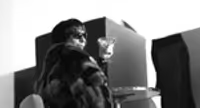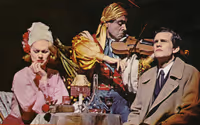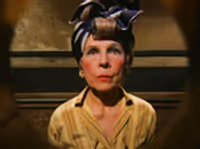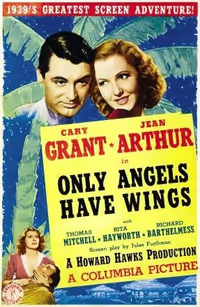Raising/Lowering Keys
Gothampc
Broadway Legend Joined: 5/20/03
#1Raising/Lowering Keys
Posted: 10/7/14 at 10:20pm
Can you name any performers who came into a musical or revival and had to have the music lowered or raised for the part they were singing?
Is it such a good idea to accommodate the singer's voice rather than honoring the keys that the composer wrote in?
#2Raising/Lowering Keys
Posted: 10/7/14 at 10:32pm
Glenn Close in Sunset Boulevard comes to mind- Lowered. It seemed the common opinion was that her singing wasn't that strong, but her acting made up for it.
Carly Rae Jepsen in Cinderella- Lowered.
#2Raising/Lowering Keys
Posted: 10/7/14 at 10:35pm
Vanessa Williams, Into The Woods.
IMO, the lowered keys made the Witch's music even eerier.
#3Raising/Lowering Keys
Posted: 10/7/14 at 10:36pm
I think it's better to make it singable than have them turn in a lousy performance.
Of course, they could have found someone who was capable of singing the original keys in the first place...
#4Raising/Lowering Keys
Posted: 10/7/14 at 10:38pmMadonna in the movie Evita
#5Raising/Lowering Keys
Posted: 10/7/14 at 10:42pm
I've always thought that raising/lowering keys were a common occurrence to best fit the performer, especially in a lead role.
I think the keys were raised for all who followed Bacall in Woman of the Year.
I also seem to recall the same happening with those who replaced Karen Akers in Nine. (Or was it Grand Hotel... or both?)
Gothampc
Broadway Legend Joined: 5/20/03
#6Raising/Lowering Keys
Posted: 10/7/14 at 10:46pm
"Madonna in the movie Evita"
Yeah, that was really sad. Those high notes that Patti always complained about were gone from A New Argentina. The song lost its fierceness.
#7Raising/Lowering Keys
Posted: 10/7/14 at 10:55pm^^ Every song lost its fierceness. I played Patti's Rainbow High and Madonna's Rainbow High back to back for my father once, and he actually burst out laughing when he heard Madonna's.
csmithmusictheater
Swing Joined: 10/25/13
#8Raising/Lowering Keys
Posted: 10/7/14 at 11:03pm
I first saw Sunset B in London with Betty Buckley, then later on Broadway with Glenn Close. First and only time in my life I felt the acting trumped any singing accommodations they made for her. Even in that cavernous hall, the softness of her voice drew you into her character. Beyond that, I think putting any song into a key that allows the performer to do 7-8 shows a week is smart.
#9Raising/Lowering Keys
Posted: 10/7/14 at 11:05pmI doubt she had to have it changed, but Keala Settle sings an octave higher in "Master of the House"
ohjustjake
Leading Actor Joined: 4/18/06
#10Raising/Lowering Keys
Posted: 10/7/14 at 11:30pmWasn't Fiyero's music transposed when Taye Diggs was in the show? I remember listening to As Long As Your Mine and thought the key was really weird.
#11Raising/Lowering Keys
Posted: 10/7/14 at 11:41pmThe most famous example of this was probably Channing in Dolly, where the notes had to be lowered a good 4 or 5 steps for most of the songs because they were originally written for La Merm.
AwesomeDanny
Broadway Legend Joined: 7/30/09
#12Raising/Lowering Keys
Posted: 10/7/14 at 11:49pmIf a song is lowered a step or two, very few people will know any difference. If you don't have perfect pitch (which is rare even among musicians), you'd have a pretty hard time figuring out if someone is singing an F or an E. However, drastically lowering keys--as in the case of the Evita film--can significantly change a composer's intentions. And it goes beyond simply the vocalist--if you significantly lower the key of "Rose's Turn," the blaring trumpets won't sound as piercing. Minor (or, rather, I should say "small") key changes shouldn't be worried about, but I'd say you have to be wary when changing by a third or more.
#13Raising/Lowering Keys
Posted: 10/8/14 at 4:46amThank you AwesomeD for your imformed response. Initially I thought if it sounds good what does it matter but had not given any thought to how it would affect the overall sound-so thanks.
jo
Broadway Legend Joined: 5/15/03
#14Raising/Lowering Keys
Posted: 10/8/14 at 6:26am
Based on the book of Edward Behr tracing the history of the first stagings of the Les Miserables musical --
The role of Jean Valjean in the original stage musical performed in Paris in 1980 was written for a baritone. It was performed by French baritone Maurice Barrier, including in the original concept album and the show highlights.
For the original English adaptation, the range was transposed up to accommodate Colm Wilkinson's golden tenor voice. Trevor Nunn was looking for the right fit for the role of a convict and had cast Colm, upon recommendation of Tim Rice and after hearing him sing Anthem. Bring Him Home was written with Colm in mind.
Updated On: 10/8/14 at 06:26 AM
The Other One
Broadway Legend Joined: 4/1/08
#15Raising/Lowering Keys
Posted: 10/8/14 at 7:34amI think the keys were lowered for Michael Rupert when he played Tateh in RAGTIME.
Pootie2
Broadway Legend Joined: 8/1/14
#16Raising/Lowering Keys
Posted: 10/8/14 at 8:06amOoh, now I have to find a recording of baritone Jean Valjean....
AEA AGMA SM
Broadway Legend Joined: 8/13/09
#17Raising/Lowering Keys
Posted: 10/8/14 at 9:19am
"Is it such a good idea to accommodate the singer's voice rather than honoring the keys that the composer wrote in?"
Having workshopped a good number of new pieces now I can tell you that there are plenty of times when what the public finally hears is not the key the composer wrote the song in. Keys will get adjusted in workshops and rehearsals to find the best match for the voice of the actor who is originating the role. So in some cases you are already not hearing anything that is "honoring" the key the composer originally wrote in.
#18Raising/Lowering Keys
Posted: 10/8/14 at 9:24am"Everything's Coming Up Roses" was lowered for Patti.
nasty_khakis
Broadway Legend Joined: 3/15/07
#19Raising/Lowering Keys
Posted: 10/8/14 at 9:35am
I once heard Patti in an interview tear into the lowering of the keys in the Evita film. She was right in her outrage, but she went on about how keys shouldn't be changed. I laughed because she herself as raised/lowered keys. In fact, she herself said they lowered her "Worst Pies" in the Doyle production to give the song a more natural conversational pitch.
I personally see nothing wrong with it as long it doesn't drastically change the tone (or should I say...feeling) of the piece.
#20Raising/Lowering Keys
Posted: 10/8/14 at 9:41am
Musical theatre (as a rule, which can be broken) isn't opera - very few theatre composers choose a key because of what it "means" to them (G minor being Mozart's favorite for expressing the tragic, for instance). Many theatre composers can't even notate their own compositions, let alone transpose or discuss what different keys mean.
That said, once we know a song, hearing it in a radically transposed key can be jarring - for instance, I never have liked hearing Sally's songs in Follies transposed up from a mezzo/belter range to full-on soprano (for Barbara Cook); also hearing Christine Ebersole sing the husky score to Applause up in her legit mezzo range just sounds like all sense of character has been washed out (to me).
There was much discussion about casting Andrea Martin, a hilarious actress with a 6-note range, as Letitia Primrose in On the Twentieth Century, a show that features a score that is a sumptuous tribute to operetta. Primrose's comic soprano aria, "Repent," would (for many) lose all meaning when transposed down into a (probably imaginary) key where Martin could handle it (a similar situation to her musically dull interpretation of the Old Lady in Candide).
#21Raising/Lowering Keys
Posted: 10/8/14 at 9:41am
In line with AEA's post, people should also be aware that although there are now computer programs that will transpose a vocal and orchestration automatically, there is still an expense incurred in reprinting orchestra parts, etc. Also, changing the key of one song may alter its relationship with the next song or segue, etc.
I was told by Mimi Hines' assistant that Mimi sang FUNNY GIRL in Barbra Streisand's keys for a year before a friend finally said to her, "YOU are the star of this show now. The keys should accommodate you!" She then demanded adjustments, which were done by hand and probably costs tens of thousands of dollars in the late 1960s. (Not that the show couldn't afford it.)
I was also told that Boyd Gaines sang "Being Alive" several steps lower for Roundabout's COMPANY, much to the chagrin of his competitors who had auditioned with the song in the original key. Speaking of which, I thought the key was almost too low for Larry Kert, but not because he couldn't hit the low notes. It was just that Dean Jones sounds as if he can barely hit the notes on the recording, which adds a lot of tension to the song; Larry sounded like he could have raised the key quite a bit in order to achieve the same tension level.
#22Raising/Lowering Keys
Posted: 10/8/14 at 9:58am
The currently licensed version of the Company score, a terrible version which incorporates all the awful changes made at the Roundabout, lowers all of Bobby's songs as well as raising the key for "Ladies Who Lunch." And if I recall correctly, "Another Hundred People" is also raised a step.
I wouldn't know how Boyd Gaines was in that show, because I saw the incredibly bland James Clow.
jo
Broadway Legend Joined: 5/15/03
#23Raising/Lowering Keys
Posted: 10/8/14 at 9:58am
>>>>Ooh, now I have to find a recording of baritone Jean Valjean....<<<
If you can find the double-CD of the Original French Concept album of Les Miserables, re-released in 1988, "the recording became the first version of the stage show in Paris" and was " the album with which Cameron Mackintosh fell in love with Les Miserables", the role of Jean Valjean was performed by French baritone Maurice Barrier. This was based on the original staging of the musical in Paris in 1980, at Palais des Sports.
There was another cast recording when the show ( Mackintosh version) was staged at the Mogador Theatre in 1991 - but the Valjean role had already been transposed to the tenor range, as it was based on the Wilkinson interpretation.
EDIT: I think album is still available on Amazon, but quite pricey for a new set. Interesting reader comment re the Valjean role --
"Valjean doesn't have many parts strangely enough, but I always thought a tenor Valjean was a bit strange. Here, he is a baritone, who sounds his age, and is very touching."
Updated On: 10/8/14 at 09:58 AM
Pootie2
Broadway Legend Joined: 8/1/14
#24Raising/Lowering Keys
Posted: 10/8/14 at 10:36amThanks, jo. Damn, so many different versions!
Videos












